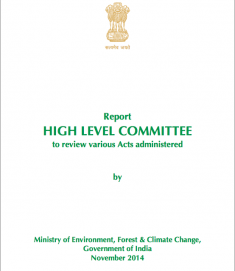Attenuation of India’s Laws
There are two divergent views concerning the role of the environment ministry in India. One group seems to think it provides, albeit inadequately, the much needed checks and balances to oversee India’s environment and forest policy. Others view it as a roadblock ministry that holds up infrastructure projects. In 2014, the new government, within three months of coming to power, sought to assuage the concerns of the latter by establishing a committee to fast-track road, railway, power and other projects of “national importance” while reviewing key environmental laws – Wildlife Protection Act of 1972, Forest Conservation Act of 1980, Environment Protection Act of 1986, the Water (Prevention and Control of Pollution) Act of 1974, and the Air (Prevention and Control of Pollution) Act of 1981.
The Committee, headed by former top bureaucrat T.S.R Subramanian, submitted their report to the environment ministry in November last year. Environmentalists and media reports expressed concern at the dilution of people's rights and the hasty dismantling of existing environmental laws. Last month the environment minister said that the Ministry has only accepted the report and its findings for further consideration. The Department Related Parliamentary Standing Committee on Science, Technology, Environment and Forest (headed by Member of Parliament Dr Ashwani Kumar) is currently examining the report and hearing views from experts on the matter.
A group of environmentalists who have studied the report have stated: “The Committee…submitted its report in less than three months, on 20-11-2014. Prepared in great haste, it is replete with factual inaccuracies, wrong and misleading conclusions and the incorrect interpretation of the laws it was meant to review". The committee report, as well as critque are appended to this blog. They were invited on January 9, 2015 to share their concerns, “…but our invitation was withdrawn at the last minute, so we could not attend the meeting, we were told we will be invited in future,” said Himanshu Thakker of the South Asia Network for Dams, Rivers and People, one of three experts who reviewed and critiqued the report.
According to the activists the process adopted by the Committee itself was flawed and controversial. They say there was no public consultation, while comments invited was stipulated not to exceed 1000 characters, or say less than 200 words. Meetings too were based on specific invitations to groups and individuals, and held in a few urban locations.
One specific terms of reference for the Committee was to examine the various Court orders with regard to laws under review. However the activists claim that the report only lists a few environmental cases having left out major recent judicial decision. According to them, there is no reference to, “The necessity to undertake comprehensive cumulative impact assessment as highlighted in Alaknanda Hydro Power v. Anuj Joshi". Also, “The Niyamgiri verdict (Orissa Mining Corporation v. Union of India), which mandated Gram Sabha consent, is similarly absent”, among others.
“There is no doubt that the framework of environmental laws needs reform. However, the reform should aim at strengthening the environmental law framework rather than weakening and diluting it,” the activists state in their critique of the report.



